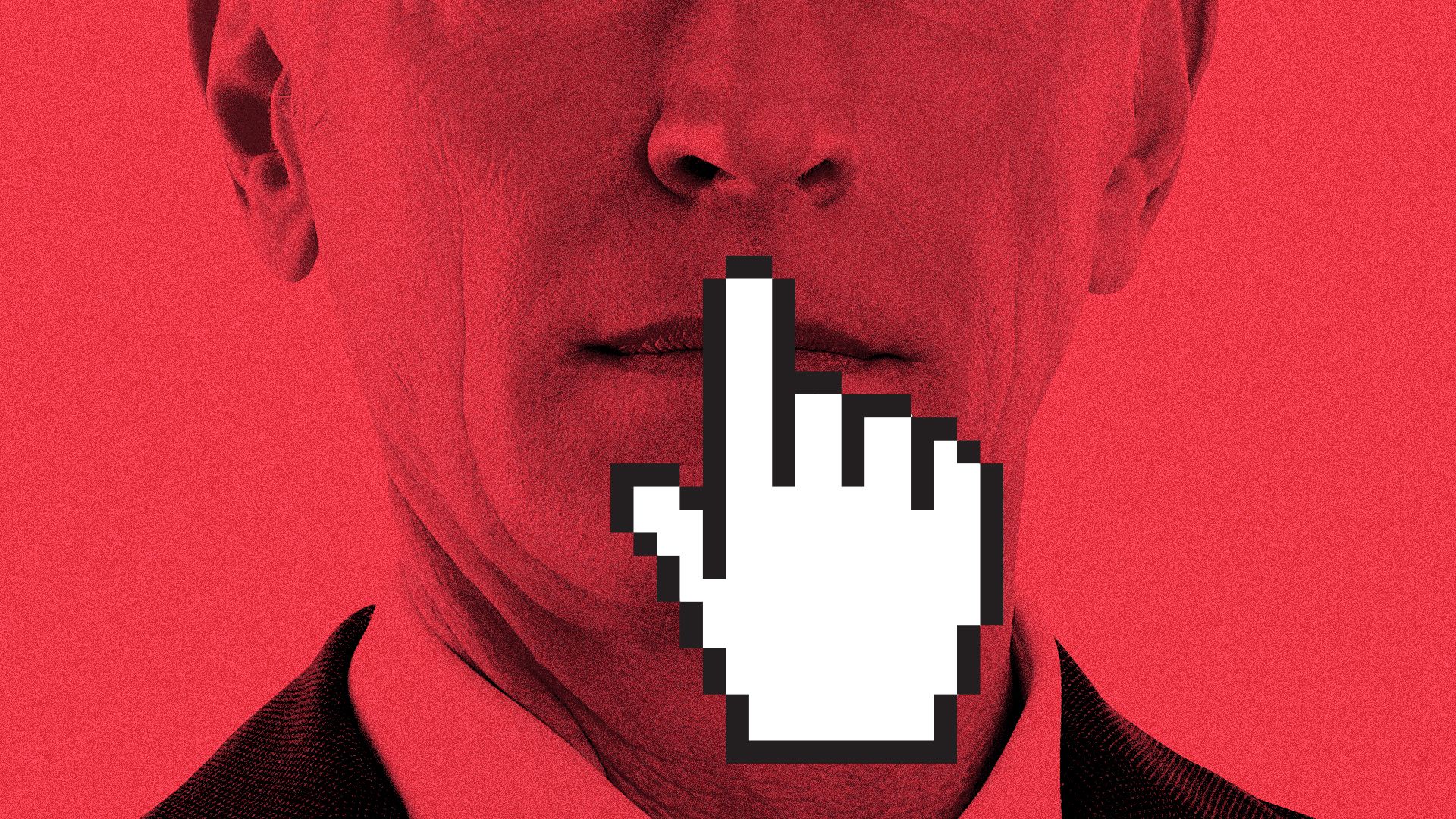Social media takes on world leaders
Add Axios as your preferred source to
see more of our stories on Google.

Illustration: Aïda Amer/Axios
Social media companies are finally beginning to take action on posts from world leaders that violate their policies, after years of letting them mostly say whatever they wanted unfiltered to millions of people.
Why it matters: Government officials are among the users most likely to abuse the wide reach and minimal regulation of tech platforms. Mounting pressure to stop harmful content from spreading amid the coronavirus pandemic, racial protests and a looming U.S. election has spurred some companies to finally do something about it.
Driving the news: Snapchat said Wednesday that it will no longer promote President Trump's account on its "Discover" page of curated content, a spokesperson told Axios, after Trump tweeted comments that some suggested glorified violence amid racial justice protests.
- "We will not amplify voices who incite racial violence and injustice by giving them free promotion on Discover," a spokesperson for Snapchat parent Snap told Axios.
The state of play: The move comes after Twitter began taking increased action on tweets from world leaders and policymakers last week.
- Last Thursday, Twitter added a fact-check label on a pair of months-old tweets from a Chinese government spokesperson that falsely suggested that the coronavirus originated in the U.S.
- Earlier that week, it fact-checked two of Trump's tweets for the first time, drawing ire from conservatives who alleged that Twitter was censoring the president and their viewpoints. Both tweets made unsubstantiated claims that mail-in ballots in the 2020 election would be fraudulent.
- Twitter later added a warning label to a tweet of Trump's calling for the military to start shooting looters of racial protests, which violated Twitter’s rules against glorifying violence.
The big picture: Tech companies often create carve-outs for world leaders in their content moderation policies, because they don't want to take down posts that could be of public interest. But those parameters have been tested as world leaders have used that freedom to suit their political needs.
- Facebook CEO Mark Zuckerberg said the company left up Trump's post that Twitter flagged last week because it referenced the National Guard and thus Facebook said it "read it as a warning about state action."
- Twitter announced a policy last June that if a tweet from a world leader does violate the its tules but there's a clear public interest in keeping the Tweet on the service, it may place it behind a public notice that provides context about the violation.
- It first did this to a tweet from from Brazilian politician Osmar Terra in April.
Be smart: Facebook and YouTube have taken some action during the pandemic, but have been much more conservative in their approach, and have mostly shied from policing election or protest misinformation.
- Facebook CEO Mark Zuckerberg said on Friday that he disagreed strongly with the president's words about the protests, but said "I believe people should be able to see this for themselves," because he appeared to be threatening military action.
- The company has in the past, however, added labels that Trump's posts on its platform were "partly false" after the president shared a video that the company had already debunked.
When the coronavirus pandemic hit, nearly every platform made clear that they intended to take strong action to police misinformation surrounding that crisis. That set them on a collision course with some national leaders.
- Facebook, YouTube and Twitter removed posts shared by Brazilian President Jair Bolsonaro for including coronavirus misinformation.
- Facebook removed content from the president of Madagascar, also for violating COVID-19 misinformation policies.
- Twitter at the time removed tweets from Venezuelan President Nicolás Maduro that included false information around the coronavirus.
The tech giants tend to be more strict about enforcing their content policies when it comes to paid advertising on their platform, as opposed to organic posts.
- Twitter has banned political ads. Google has limited politician's ability to micro-target ads. Snapchat fact-checks them.
- Zuckerberg has said that Facebook will not fact check political ads because he thinks "people should be able to see for themselves what politicians are saying. And if content is newsworthy, we also won't take it down even if it would otherwise conflict with many of our standards."
- Facebook has made some exceptions to this rule, though — for example, when it removed census-related ads from the Trump campaign.
The bottom line: Snapchat's move is another sign that tech platforms are developing a whole spectrum of responses to the problem of what to do when political leaders post rule-breaking messages beyond the binary choice of "take it down or leave it up."
- It's also a reminder that social media platforms are private companies that are free to set, enforce, and change their own rules as they please.
